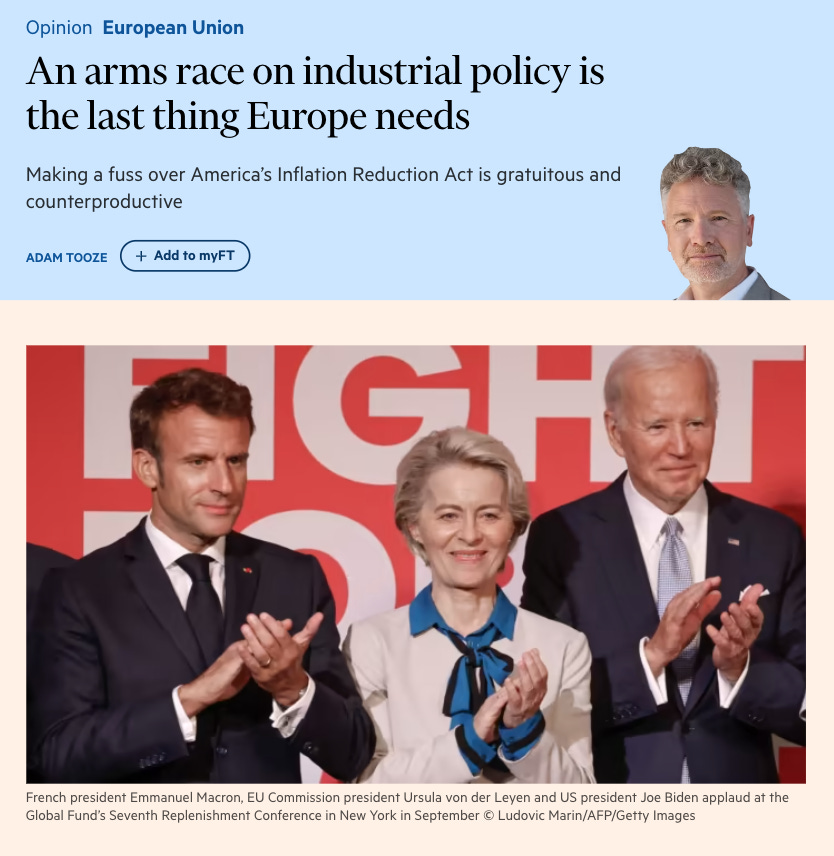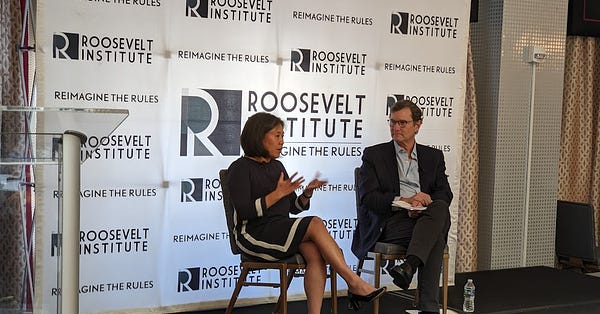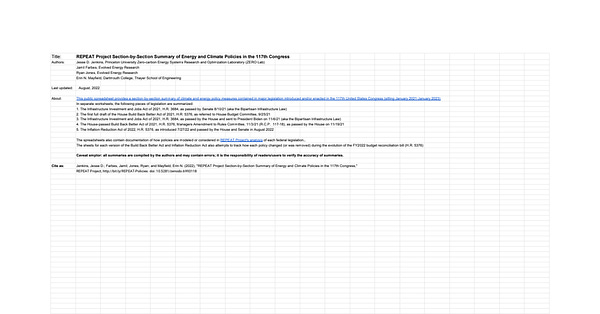If you travel to South Korea or Europe right now, the talk in international economic policy circles is all about one thing: America’s “giant” Inflation Reduction Act and its $500 billion in subsidies for green energy and industry in the United States.
I did an op ed for the FT on the question of how Europe is reacting to the IRA.
Cameron Abadi and I took up the issue of US trade policy more generally on the podcast this week, focusing less on the IRA and more on the WTO.
Is Biden Killing the World Trade Organization? Ones and Tooze |
Whilst in Berlin I did an interview with Handelsblatt (in German) addressing the question of the future of German industry.
There is certainly something afoot in US international economic policy. If we put together the buy (North) American and local content clauses in the IRA, clashes with the WTO over Trump’s tariffs, the Chips Act and the ongoing “tech war” with China, two questions force themselves on us:
Are we witnessing a fundamental shift in the politics of trade in the US? Is there a new Washington consensus?
If so, how should America’s “partners” react?
The answer to the first question is that it is still early days, but all the signs are that we are indeed witnessing a profound shift in the positioning of US power towards the world economy. Already in the 2016 Presidential election the US Chamber of Commerce was alarmed to note that none of the three leading candidates - Trump, Sanders or Clinton - could be described as favoring further trade liberalization. It was an open secret that if Clinton had been elected, her team were going to abandon the TPP, the ambitious 12-nation Pacific trade partnership that Obama’s team had negotiated. Trump did so on his first day in office.
Six years on, the shift in both policy and politics is more dramatic than ever. Of course, the Biden administration talks nicely and backed the Nigerian Ngozi Okonjo-Iweala as a popular new head of the WTO, after her predecessor the Brazilian Roberto Azevêdo abruptly resigned. But good vibes aside, the Biden administration has done little or nothing to help in reanimating the WTO as a functioning global organization. Trump’s opposition left the WTO without a functioning appellate procedure for disputes. Nothing has changed on that score. And the administration has been anything other than supportive of the efforts by concerned groups of nations, including the EU, to put in place alternative conflict management procedures.
The bon homie of the Biden administration means that, unlike under Trump, this disruption barely breaks surface and makes it harder in fact for commentators and the rest of the world to orientate themselves. It looks like the US is abandoning the structures of global trade that it did so much to build between 1945 and the early 2000s. It smells as though it is. It sounds as though that is the plan. Can it possibly be true?
The tone of Paul Krugman’s recent piece in the New York Times is telling. The leading trade economist of his generation cannot avoid the conclusion that something dramatic is happening. The willingness of the Biden team to flaunt the view of the WTO and its partners, Krugman writes,
… is a very big deal, much bigger than Trump’s tariff tantrums. The Biden administration has turned remarkably tough on trade, in ways that make sense given the state of the world but also make me very nervous. Trump may have huffed and puffed, but Biden is quietly shifting the basic foundations of the world economic order. … But if the United States, which essentially created the postwar trading system, is willing to bend the rules to pursue its strategic goals, doesn’t this run the risk of protectionism growing worldwide? Yes, it does.
Though Krugman pronounces himself a bit “nervous” he concludes by affirming the Biden administration’s stance, both on China and climate: “The GATT (sic) is important, but not more important than protecting democracy and saving the planet.”
Of course, we need to check any assessment of the politics of trade in the US against the macroeconomic facts on the ground. As Michael Pettis reminds us, it is a little “surreal” when economic powers that run huge and persistent trade surpluses, like China and the EU, accuse the United States, which runs the largest persistent trade deficit, of protectionism.

But check out this response from the US Trade Representative to a WTO panel finding on steel and aluminium and tell me that you don’t feel a cold wind blowing.
“The United States strongly rejects the flawed interpretation and conclusions in the World Trade Organization (WTO) Panel reports released today regarding challenges to the United States’ Section 232 measures on steel and aluminum brought by China and others. The United States has held the clear and unequivocal position, for over 70 years, that issues of national security cannot be reviewed in WTO dispute settlement and the WTO has no authority to second-guess the ability of a WTO Member to respond to a wide-range of threats to its security. These WTO panel reports only reinforce the need to fundamentally reform the WTO dispute settlement system. The WTO has proven ineffective at stopping severe and persistent non-market excess capacity from the PRC and others that is an existential threat to market-oriented steel and aluminum sectors and a threat to U.S. national security. The WTO now suggests that the United States too must stand idly by. The United States will not cede decision-making over its essential security to WTO panels. The Biden Administration is committed to preserving U.S. national security by ensuring the long-term viability of our steel and aluminum industries, and we do not intend to remove the Section 232 duties as a result of these disputes.”
Nor is it just national security that is at stake. Especially when it comes to the Inflation Reduction Act there is great enthusiasm across the spectrum of progressive think tanks in the United States for a new era of industrial policy. This embraces climate policy and the anti-China stance, invoked by Krugman to justify from the WTO rules. It also extends to what was formerly the agenda of Build Back Better and the Green New Deal i.e. a vision of domestic economic and social reconstruction, impelled by a broad-based agenda of energy transition and green industrialization.
If you want to get a sense of the thinking within this ecosystem there is no better source than Todd Tucker at the Roosevelt Institute, whose twitter account delivers a rolling drumbeat of new policy initiatives.


In commentary in the Washington Post, Tucker posits a clash between, on the one hand, a rigid adherence to the existing trade regime which goes hand in hand with carbon pricing as the main tool for decarbonization, and, on the other hand, the kind of approach favored by the Biden administration, which focuses on the more “politically attractive” route of national industrial subsidies.
Countries like the United States are trying to fight the climate crisis by offering industries green incentives, rather than simply taxing industrial emissions. That’s likely to require some assurance that the WTO will permit exceptions for what countries deem to be nationally appropriate decarbonization pathways. If WTO trade panelists don’t offer more deference to national policymakers than these two recent cases suggest, we are likely to see greater calls by environmental groups for a substantial paring back of trade rules for the duration of the climate emergency.
Behind phrases such as “politically attractive” and “nationally appropriate decarbonization” there is a complex agenda of coalition-building which sees green industrialism as a better future for the American working-class and American society in general. The show case was a recent Progressive Industrial Policy summit.

But even setting aside issues of American social and economic order, if you read the recent treatments of decarbonization policy by leading US experts such as Victor and Cullenward and Victor and Sabel respectively, they too favor an approach to decarbonization that focuses not on global carbon pricing, but on driving innovation through national and transnational industrial networks. In 2021, the putative EU-US steel and aluminium club proposed at COP26 in Glasgow were seen as a promising step towards cooperation. But, as Tucker points out, this EU-US deal is likely to. be challenged by the Chinese. And none of this can disguise the fact that the Inflation Reduction Act with its strong emphasis on production within North America and local content rules is a step back from wider international cooperation. This is why I refer in my FT piece to the IRA as a “morbid symptom”. Though it is the largest climate action ever passed by the US Congress and though it may promise an acceleration of decarbonization in the US, it is devoid of any international or global vision. It is the product of a deadlocked Congress that can rally majorities only when they are draped in the Stars and Stripes and larded with anti-Chinese measures. I would love to be told otherwise, but I would be staggered if anyone in the fevered negotiations on Capitol Hill in July 2022 from which the IRA suddenly emerged, ever considered its WTO conformity, or the likely reaction of America’s major global partners.
Of course, advocates of the new Washington consensus will tell you that there is more to US industrial policy than the legislation dictated by Joe Manchin. And even the legislation extracted from Manchin offers substantial support for industrial innovation. Nor are the subsidies on offer confined to US businesses. So long as they produce in the United States and meet the local content rules, European and other foreign firms can qualify. But whereas the negative impacts on Europe and Korea may be a matter of absent mindedness, the same cannot be said with regard to the IRA’s hostility towards China and this constitutes a de fact challenge to globalization as we know it.
Which brings us to the reaction of the rest of the world to the Inflation Reduction Act and the extraordinarily late but heated response from the EU. Already in August South Korea was making representations to the US over the blatant discrimination they feared against their auto champion, the #3 auto manufacturer in the world Hyundai/Kia. Remarkably, Europe barely seems to have noticed the IRA until November, when in the aftermath of the COP27 negotiations in Egypt, a flurry of European protest began. One is tempted to suggest that it was the insistent boasting of the US delegation at the COP talks that alerted the Europeans to the IRA’s scale and its possible implications.
Right now, as far as high-level political discussion is concerned, the IRA is a hotter subject of discussion in Europe than it is in the United States. If Stanley Cohen once defined the social phenomenon of the “moral panic”, one is tempted to say that what the Inflation Reduction Act has unleashed in Europe is a “policy panic”: an echo-chamber of zealous and intense responses to a perceived existential threat.
One might also say that whilst the aggressive new Washington Consensus concerned mainly measures against China, Europe could afford to be complacent. With the Inflation Reduction Act, core European industrial interests in the auto sector are now seen to be in harms way.
Europe can no longer escape the reality that something quite fundamental and comprehensive is changing in America’s approach to the world economy. But how dramatic is that shift as far as Europe is concerned and what should Europe’s response be? This is where the question of realism arises. Not realism in the sense of academic international relations theory, which is actually a highly schematic account of the world, but realism in the sense of self-reflective effort to engage with a complex reality that includes “others”, in this case the United States, and its peculiar view of the world.
If you followed the European rhetoric and that of the boosters of the Biden administration you might easily arrive at the conclusion that the Inflation Reduction Act is a dramatic and large-scale intervention. The headline figure of $500 billion in spending is large. And, of course, in a piece of legislation over 700 pages long, there are lots of important spending items.
But whether judged against the size of US economy, the problems of American society and its economic structure, or the challenge of decarbonization, the Inflation Reduction Act is modest. That shouldn’t be surprising. Remember how the sausage was made. What we are left with, is what Manchin could somehow agree to.
Will the IRA take the United States a long way towards its decarbonization targets? Hopefully. There is no way of being certain. The IRA does not set a carbon cap, as an emission trading system does. It is all carrots and no sticks. Whether the tax incentives are large enough to induce the desired effect, we can only hope. That hope is informed by detailed modeling by a bevy of think tanks. They are super-smart people and their calculations are rigorous, but as they would be the first to acknowledge, they are hypotheticals.

As far as subsidy to renewal energy expansion is concerned, the IRA’s $ 385 billion sounds like a lot. But it is spread over a decade and must be placed in relation to a US economy that runs to $22 trillion. In relation to US GDP the IRA offers half the level of subsidy that Europe has already committed to green energy. As Daniel Groscoolly remarks, given its limited scale, the IRA has no more chance of reindustrializing America along green lines than Trump’s tariffs did of restoring the rustbelt. For all the European scaremongering, I’ve yet to meet anyone who thinks that the “buy America” provisions will restore Ford or GM to global leadership in EV. GM is almost as heavily committed to China as VW and Ford’s EV strategy in fact relies heavily on cooperation with VW. The more serious worry amongst representatives of the German car industry I’ve spoken to, is the impact of the IRA on the automotive supply chain and specifically batteries. They worry that America’s large subsidies for the on-shoring of battery production will draw investment away from Europe. But it seems strange to treat this as a zero sum question. If there is one thing that we know for certain, it is that the world is going to need truly vast capacities for battery production and whatever efforts they make, neither Europe nor North America will be the main supplier. Whatever efforts both undertake will be dwarfed by China. If German carmakers want more locally produced batteries then they either need to lobby for even more subsidies or draft their own local content rules. The French have long been arguing for “buy European” clauses.
In short, a realistic assessment suggests that the EU’s exaggerated reaction to the IRA has less to do with the actual IRA than with Europe’s own deep and very serious anxieties about itself. This is what echoes through concerns about the size of the American package and the urgency with which it is being pursued. In light of the fact that NextGen EU was passed by Europe already in 2020 and the passage of the American Inflation Reduction Act was in fact agonizingly protracted, and involved profound embarrassment for the Biden administration, this European talk is revealing. Apparently advocates of a bigger and more active Europe, cannot do without external reference points.
One could chide the Europeans for losing the plot, but instead what I suggest in the FT piece is that we should take their own political processes seriously. Europe’s political class currently have a bit of complex about issues of sovereignty and strategic autonomy. This is not helped by the ubiquity of Jean Monnet’s famous functionalist quip that Europe is a product of crisis and the accumulated solutions that have emerged to those crises. That was always an inadequate description. There may, indeed, be a functionalist logic impelling one crisis and one solution after another. But that process is is not deterministic and it is actuated and shaped by politics. Crises have to be defined. Solutions are found or not. Since the early 2000s with shattering referendum results on the European Constitution and the reemphasis on inter-governmentalism this has has been an increasingly uphill battle. It isn’t by accident that the concept of polycrisis was coined by Jean-Claude Juncker as Commissio President. The pandemic and Putin have delivered further staggering shock. The least you can say about the current storm over the paper-tiger of the IRA, is that this is a fight that the European political elite have chosen for themselves.
It is tempting, in fact, to cite the policy panic over the IRA as a continuation of Luuk van Middelaar’s narrative of contemporary Europe. Europe is getting more political, tougher, more Machiavellian. It is learning to define its enemies. It recognizes the advent of the new Washington Consensus on the world economy, as a crisis. It has declared an exception.
This Schmittian logic is convincing up to a point and may, in fact, be in the minds of European actors. But, is it the best way to imagine the politics of industrial policy or the energy transition? Why start with polemics rather than alliances and friendship? And let us not allow a definition of sovereignty as the ability to stand up to global bullies, whether Putin or the new economic nationalists in Washington, to occlude the question of judgement. Not every fight is a good fight. Not every provocation demands a response. And if you ask whether this is a moment to pick a fight with the Biden administration over the IRA, to push back against the new Washington consensus in the name of WTO conformity, the answer is surely obvious. No it is not.
Does this imply surrendering to US hegemony? No. It simply implies focusing on real challenges, doing what is needed and avoiding unnecessary polemics with an indispensable ally. For all Europe’s vanity about its climate policies, there is a huge amount to be done. Europe’s own EV program needs urgently to be accelerated. And in this regard, though the IRA may favor investment in US and US jobs, Detroit is a relatively spent force. As far as climate policy is concerned, wrangling the European automotive lobby is every bit as serious a challenge.
Does this imply moving beyond the principles of international trade as they were conceived in the 1990s and 2000s. Yes it does. And what the recent pivot makes clear, is that though the US was the principal force behind the old Washington consensus on globalization, it, in fact, has less invested in its foundational principles than Europe. This is a conclusion that should not be a conclusion that is surprising in light of the histories of global neoliberalism produced by Quinn Slobodian and Rawi Abdelal. As Cameron and I discus on the podcast, principles of equal treatment, restraint, rule of law matter deeply to Europe for its own internal reasons. They help to hold the complex structure of the EU with its 27 member states together. The idea of a rule-bound international trading order simply does not have that significance for America’s political economy. If national political imperatives dictate a new era of national industrial policy, so be it.
The lesson is clear. America will do things its way. Given the precarious balance of its domestic politics there is room for nothing else. But noxious as it may be, the Inflation Reduction Act is not an existential threat to European economic interests. Nor is there need to rub the nose of the Biden administration and its outriders in the mess left by their abandonment of 1990s globalism. The point is not lost inside the Beltway. The advocates of the new Washington Consensus quite explicitly acknowledge the shipwreck, in America itself, of policies once pushed by the Democratic Party elite. What is called for now is cooperative action to accelerate decarbonization by whatever means work. They may call it a new Washington Consensus but this is not a vision of order like that of the 1990s. It is not an ordoliberalism writ large. It is an ad hoc agenda for problem-solving action. Rather than clear rules and norms, it entails a mass of decisions and policy-choices. And those will entail conflicts and demand politics and diplomacy. In light of the urgency of the polycrisis that is a healthy disillusionment. It is a sign that economic policy is catching up with reality.




